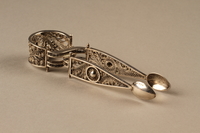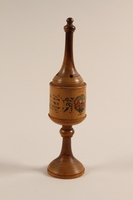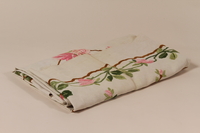Overview
- Description
- The Hannah Deutch papers consist of photographs and personal items relating to Hannah’s family prior to World War II. Hannah escaped Germany via a Kindertransport and eventually became a nurse in London during the war. Contained in the papers are photo albums of Hannah’s youth, vacations, and family portraits. The personal items contain various documents such as Hannah’s marriage certificate, the passenger list for the ship her mother travelled on when she immigrated to Chile in 1939, her great-grandmother’s prayer book from 1884, and a song sheet from her synagogue. Also included are post-war documents, such as information on the history of Bochum, Germany, material related to a survivor’s reunion, and recognition awards presented to Hannah.
- Date
-
inclusive:
1884-2005
- Credit Line
- United States Holocaust Memorial Museum Collection, Gift of Hannah Kronheim Deutch
- Collection Creator
- Hannah Kronheim Deutch
- Biography
-
Hannelore (Hannah) Kronheim was born in Dusseldorf, Germany, on July 3, 1922, to Alfred and Ella Paula (born 1896) Kronheim. When she was two, the family moved to Bochum. Her father died in 1929 during the influenza epidemic. In 1933, Hitler became Chancellor and established the Nazi dictatorship in Germany. Laws and policies were enacted to disenfranchise and persecute Jews. In 1936, Hannah and her mother were evicted from their home. Hannah had friends tell her that they could no longer associate with her. One night during the November 8-9, 1938, Kristallnacht pogrom, Hannah awoke because the bed was shaking and the room was filled with light. The light was from the burning of the synagogue located behind their home that had been set on fire by anti-Jewish vandals. They were also smashing windows of nearby Jewish owned businesses. Their home was not vandalized, possibly because all the inhabitants were women. The next day they watched as all the Jewish males were rounded up and taken to concentration camps and prisons. Hannah’s mother decided to send Hannah away to keep her safe. Hannah’s great aunt had a cousin in charge of kindertransports to London and Hannah was put on the list of children to leave Germany. She departed from Cologne on February 2, 1939. Hannah, at 18, was the eldest child on the transport. The group’s leader was a young bachelor, so Hannah was the one who took care of all of the children, including 10 children under the age of 1. They arrived in Hoek, Holland, where Hannah was detained and strip-searched. They traveled by ferry to Harwich, England, on February 3, 1939. Upon landing, they were taken to a large hall where, per advance arrangements, all the children were met by relatives or foster homes. Several children clung to Hannah and the leave taking was traumatic for her. She had been added to the list by the Committee and only minimal arrangements had been made for her. As she wrote later: “In the end I stood alone and waited until someone appointed from the committee came to take me to a boarding house.”
She lived in Wilsden Green from February 1939 to September 1940 and in a hostel from September to November 1940, when she was sent to Port Erin internment camp on the Isle of Man until October 1941. Hannah trained as a nurse and served in various British Army camps from December 1941 to October 1944. She was based in London and treated war casualties. She endured the Blitz and was in her apartment when it was hit by a bomb and destroyed. She married Daniel Deutch, a Canadian soldier, at Golders Green, on November 14, 1943. She left for Canada in November 1944. She and Daniel had two sons. Daniel had been wounded during the war and died as a result of these injuries in 1949. Hannah's mother Ella had remarried to Otto Mayer and emigrated to Chile in 1939, after securing Mayer’s release from the concentration camp where he had been held since Kristallnacht. Many of her family members were killed during the Holocaust; her grandparents, Berta Bluhm (b. 1877) and Eugene Wittgenstein, all her aunts and uncles, and many cousins died in various concentration camps. Hannah lived in Canada until 1949, when she left to reunite with her mother in Chile. In 1955, she returned to Canada. In 1962, she relocated to the United States. She settled in Queens and was very involved in B'nai B'rith and Jewish War Veterans Council. She had also spoken to many groups about her wartime experiences.
Physical Details
- Genre/Form
- Photograph albums. Prayer-books. Certificates. Programs.
- Extent
-
1 box
1 oversize box
- System of Arrangement
- The Hannah Deutch papers are arranged as three series:
•Series 1: Personal items, 1884-1943
•Series 2: Photographs, 1900-1942
•Series 3: Post-war, 1995-2005
Rights & Restrictions
- Conditions on Access
- There are no known restrictions on access to this material.
- Conditions on Use
- Material(s) in this collection may be protected by copyright and/or related rights. You do not require further permission from the Museum to use this material. The user is solely responsible for making a determination as to if and how the material may be used.
Keywords & Subjects
Administrative Notes
- Holder of Originals
-
United States Holocaust Memorial Museum
- Legal Status
- Permanent Collection
- Provenance
- The Hannah Deutch papers were donated to the United States Holocaust Memorial Museum in 2006 by Hannah Kronheim Deutch.
- Record last modified:
- 2022-07-28 17:50:08
- This page:
- https://collections.ushmm.org/search/catalog/irn38278
Additional Resources
Download & Licensing
In-Person Research
- Available for Research
- Plan a Research Visit
-
Request in Shapell Center Reading Room
Bowie, MD
Contact Us
Also in Hannah Kronheim Deutch collection
The collection consists of a spice box, sugar tongs, a tabelcloth, books, documents, and photographs relating to the experiences of Hannah Kronheim, a Kindertransport refugee from Bochum, Germany, and her family before and during the Holocaust.
Date: 1939-1943

Silver sugar tongs carried by a Kindertransport refugee
Object
Sugar tongs carried by Hannah Kronheim, 17, who left Germany in 1939 on the Kinderstransport [Children's Transport]. She left soon after Kristallnacht, November 9 and 10, 1938, when the synagogue behind her home in Bochum was set on fire. She arrived in Harwich, England, on February 3, 1939. Hannah was older than most of the children, and no placement arrangements were made for her. She was housed in a boarding house, then a hostel until November 1940 when she was sent to Port Erin internment camp on the Isle of Man. Her mother, Ella Kronheim Mayer, left for Chile on August 25, 1939, with her second husband, Otto. In October 1941, Hannah enlisted as a nurse in the British Army Auxiliary Territorial Service. She served in different Army camps from December 1941-October 1944, but was mostly in London and was bombed out during the Blitz. She married Daniel Deutch, a Canadian soldier, in November 1943 and emigrated to Canada in November 1944. Most of Hannah's family members were killed during the Holocaust.

Painted wooden spice box kept by by a Kindertransport refugee
Object
Olive wood spice tower with cloves carried by 17 year old Hannah Kronheim when she left Bochum, Germany, on the Kinderstransport [Children's Transport] in 1939. The box was made in Palestine and used for years by her family. A spice (besamim) box is used during the Havdalah, or separation ceremony, at the end of Shabbat every week. The box is filled with a fragrant spice, such as cinnamon or cloves, and is passed around so that everyone can be be rejuvenated by the sweet smell. Hannah left soon after Kristallnacht, November 9 and 10, 1938, when the synagogue behind her home was set on fire. She arrived in Harwich, England, on February 3, 1939. Hannah was older than most of the children, and no placement arrangements were made for her. She was housed in a boarding house, then a hostel until November 1940 when she was sent to Port Erin internment camp on the Isle of Man. Her mother, Ella Kronheim Mayer, left for Chile on August 25, 1939, with her second husband, Otto. In October 1941, Hannah enlisted as a nurse in the British Army Auxiliary Territorial Service. She served in different British Army camps from December 1941-October 1944, but was chiefly stationed in London and was bombed out during the Blitz. She married Daniel Deutch, a Canadian soldier, in November 1943 and emigrated to Canada in November 1944. Most of Hannah's family members were killed during the Holocaust.

Rose embroidered tablecloth kept by a Kindertransport refugee
Object
Tablecloth with roses embroidered by her mother carried by 17 year old Hannah Kronheim when she left Germany on the Kinderstransport [Children's Transport] in 1939. Hannah left soon after Kristallnacht, November 9 and 10, 1938, when the synagogue behind her home in Bochum was set on fire. She arrived in Harwich, England, on February 3, 1939. Hannah was older than most of the children, and no placement arrangements were made for her. She was housed in a boarding house, then a hostel until November 1940 when she was sent to Port Erin internment camp on the Isle of Man. Her mother, Ella Kronheim Mayer, left for Chile on August 25, 1939, with her second husband, Otto. In October 1941, Hannah enlisted as a nurse in the British Army Auxiliary Territorial Service. She served in different British Army camps from December 1941-October 1944, but was chiefly stationed in London and was bombed out during the Blitz. She married Daniel Deutch, a Canadian soldier, in November 1943 and emigrated to Canada in November 1944. Most of Hannah's family members were killed during the Holocaust.
Cookbook
Object
German cookbook owned by Hannah Kronheim, 17, who left Germany in 1939 on the Kinderstransport [Children's Transport]. She left soon after Kristallnacht, November 9 and 10, 1938, when the synagogue behind her home in Bochum was set on fire. She arrived in Harwich, England, on February 3, 1939. Hannah was older than most of the children, and no placement arrangements were made for her. She was housed in a boarding house, then a hostel until November 1940 when she was sent to Port Erin internment camp on the Isle of Man. Her mother, Ella Kronheim Mayer, left for Chile on August 25, 1939, with her second husband, Otto. In October 1941, Hannah enlisted as a nurse in the British Army Auxiliary Territorial Service. She served in different Army camps from December 1941-October 1944, but was mostly in London and was bombed out during the Blitz. She married Daniel Deutch, a Canadian soldier, in November 1943 and emigrated to Canada in November 1944. Most of Hannah's family members were killed during the Holocaust.
Prayer book
Object
Jewish prayer book owned by Hannah Kronheim, 17, who left Germany in 1939 on the Kinderstransport [Children's Transport]. She left soon after Kristallnacht, November 9 and 10, 1938, when the synagogue behind her home in Bochum was set on fire. She arrived in Harwich, England, on February 3, 1939. Hannah was older than most of the children, and no placement arrangements were made for her. She was housed in a boarding house, then a hostel until November 1940 when she was sent to Port Erin internment camp on the Isle of Man. Her mother, Ella Kronheim Mayer, left for Chile on August 25, 1939, with her second husband, Otto. In October 1941, Hannah enlisted as a nurse in the British Army Auxiliary Territorial Service. She served in different Army camps from December 1941-October 1944, but was mostly in London and was bombed out during the Blitz. She married Daniel Deutch, a Canadian soldier, in November 1943 and emigrated to Canada in November 1944. Most of Hannah's family members were killed during the Holocaust.
Book
Object
Book of Bible stories owned by Hannah Kronheim, 17, who left Germany in 1939 on the Kinderstransport [Children's Transport]. She left soon after Kristallnacht, November 9 and 10, 1938, when the synagogue behind her home in Bochum was set on fire. She arrived in Harwich, England, on February 3, 1939. Hannah was older than most of the children, and no placement arrangements were made for her. She was housed in a boarding house, then a hostel until November 1940 when she was sent to Port Erin internment camp on the Isle of Man. Her mother, Ella Kronheim Mayer, left for Chile on August 25, 1939, with her second husband, Otto. In October 1941, Hannah enlisted as a nurse in the British Army Auxiliary Territorial Service. She served in different Army camps from December 1941-October 1944, but was mostly in London and was bombed out during the Blitz. She married Daniel Deutch, a Canadian soldier, in November 1943 and emigrated to Canada in November 1944. Most of Hannah's family members were killed during the Holocaust.
Prayer book
Object
Jewish prayer book owned by Hannah Kronheim, 17, who left Germany in 1939 on the Kinderstransport [Children's Transport]. She left soon after Kristallnacht, November 9 and 10, 1938, when the synagogue behind her home in Bochum was set on fire. She arrived in Harwich, England, on February 3, 1939. Hannah was older than most of the children, and no placement arrangements were made for her. She was housed in a boarding house, then a hostel until November 1940 when she was sent to Port Erin internment camp on the Isle of Man. Her mother, Ella Kronheim Mayer, left for Chile on August 25, 1939, with her second husband, Otto. In October 1941, Hannah enlisted as a nurse in the British Army Auxiliary Territorial Service. She served in different Army camps from December 1941-October 1944, but was mostly in London and was bombed out during the Blitz. She married Daniel Deutch, a Canadian soldier, in November 1943 and emigrated to Canada in November 1944. Most of Hannah's family members were killed during the Holocaust.
Prayer book
Object
Book of Jewish blessings and prayers owned by Hannah Kronheim, 17, who left Germany in 1939 on the Kinderstransport [Children's Transport]. She left soon after Kristallnacht, November 9 and 10, 1938, when the synagogue behind her home in Bochum was set on fire. She arrived in Harwich, England, on February 3, 1939. Hannah was older than most of the children, and no placement arrangements were made for her. She was housed in a boarding house, then a hostel until November 1940 when she was sent to Port Erin internment camp on the Isle of Man. Her mother, Ella Kronheim Mayer, left for Chile on August 25, 1939, with her second husband, Otto. In October 1941, Hannah enlisted as a nurse in the British Army Auxiliary Territorial Service. She served in different Army camps from December 1941-October 1944, but was mostly in London and was bombed out during the Blitz. She married Daniel Deutch, a Canadian soldier, in November 1943 and emigrated to Canada in November 1944. Most of Hannah's family members were killed during the Holocaust.
Prayer book
Object
Jewish book of remembrance owned by Hannah Kronheim, 17, who left Germany in 1939 on the Kinderstransport [Children's Transport]. She left soon after Kristallnacht, November 9 and 10, 1938, when the synagogue behind her home in Bochum was set on fire. She arrived in Harwich, England, on February 3, 1939. Hannah was older than most of the children, and no placement arrangements were made for her. She was housed in a boarding house, then a hostel until November 1940 when she was sent to Port Erin internment camp on the Isle of Man. Her mother, Ella Kronheim Mayer, left for Chile on August 25, 1939, with her second husband, Otto. In October 1941, Hannah enlisted as a nurse in the British Army Auxiliary Territorial Service. She served in different Army camps from December 1941-October 1944, but was mostly in London and was bombed out during the Blitz. She married Daniel Deutch, a Canadian soldier, in November 1943 and emigrated to Canada in November 1944. Most of Hannah's family members were killed during the Holocaust.
Prayer book
Object
Jewish prayer book owned by Hannah Kronheim, 17, who left Germany in 1939 on the Kinderstransport [Children's Transport]. She left soon after Kristallnacht, November 9 and 10, 1938, when the synagogue behind her home in Bochum was set on fire. She arrived in Harwich, England, on February 3, 1939. Hannah was older than most of the children, and no placement arrangements were made for her. She was housed in a boarding house, then a hostel until November 1940 when she was sent to Port Erin internment camp on the Isle of Man. Her mother, Ella Kronheim Mayer, left for Chile on August 25, 1939, with her second husband, Otto. In October 1941, Hannah enlisted as a nurse in the British Army Auxiliary Territorial Service. She served in different Army camps from December 1941-October 1944, but was mostly in London and was bombed out during the Blitz. She married Daniel Deutch, a Canadian soldier, in November 1943 and emigrated to Canada in November 1944. Most of Hannah's family members were killed during the Holocaust.



